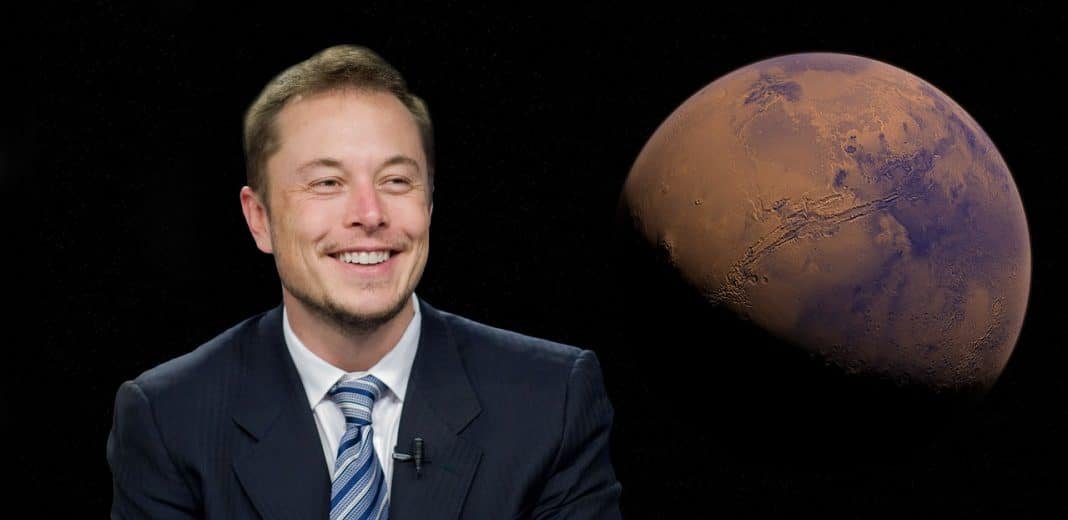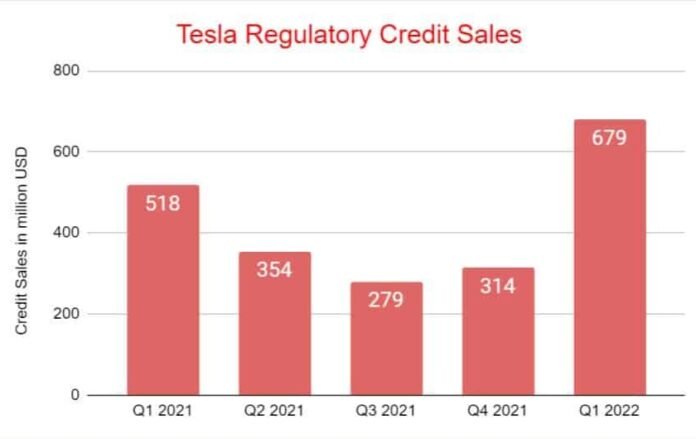Click here to view the infographic version of this content.
Tesla beat 1st quarter income expectations with more than double previous quarters’ carbon credit sales.
Tesla has been criticized for its previous years’ earnings being dependent on the sales of its carbon credits. These credit sales have been a major driver of Tesla’s profits over the years.
January 2022 Update: In Q4-2022 financials just released, Tesla Carbon Credit sales reach record $1.78 billion in 2022.
But since it separated reporting its regulatory credits from other sales, it showed that it’s profitable.
The carmaker revealed a big jump in its net income in its latest quarterly report. This is a plus for the company’s reputation as it managed to exceed Wall Street’s estimates. And this is amid the worst supply chain shocks hitting the entire industry right now.
Tesla’s profits on electric vehicles totaled $3.22 a share, beating the $2.27 estimates. Also, actual revenue rose to $18.8 billion, higher than $17.9 billion estimates.
Most interesting is its $679 million carbon credit sales. It’s more than double the prior quarter’s sales of $314 million and is even much higher than its Q1 2021 sales ($518 million). Its Q2 2021 and Q3 2021 credit sales are $354 million and $279 million, respectively.
The chart below shows Tesla’s regulatory credit sales since Q1 2021.
Tesla’s regulatory carbon credit sales account for over 20% of its profits this quarter. Tesla has warned that carbon credit sales in the future will fluctuate and decline.
Tesla’s Regulatory Carbon Credit Performance
Tesla has earned billions already through its regulatory carbon credit sales. This allows other automakers to meet emissions regulations and avoid billions in fines.
Tesla has been receiving emissions credits from various local regulations sources like California’s ZEV program. These credits are then sold which helps the company’s bottom line.
Tesla has been getting paid by other carmakers for selling its carbon credits for years whose names used to be a secret.
But a report from Bloomberg revealed two famous names. These are General Motors and Fiat Chrysler Automobiles (FCA). About how much exactly they’re buying, it’s between them and Tesla.
So far, it’s only Tesla that’s selling a lot of regulatory credits within the industry. Others even speculated that Volkswagen is also buying credits from Tesla to offset its huge emissions credit shortage in China. While others are striving to be at par with Tesla’s all-electric car production.
What Comes Next For Tesla’s Regulatory Carbon Credits?
Governments are tightening up their regulations to decarbonize the automotive industry. This is because of the urgent need to tackle climate change and the industry’s huge emissions.
In a sense, this seems to drive Tesla’s carbon credit sales further up in the coming years. Plus, the company remains the most-valuable zero-emissions vehicle (ZEV) maker by volume.
Unfortunately, other major automakers are also catching up on their own ZEVs programs. It means that they will rely less on Tesla in meeting the regulatory carbon credit cap.
For instance, Europe’s Stellantis that owns FCA (once Tesla’s biggest buyer of carbon credits) planned to sell more of its own ZEVs.
In fact, it had significant emissions reductions in 2021 with its electrification ramp-up. This involves its battery electric vehicles and low emission vehicle programs.
The European carmaker also pledged to reach net-zero by 2038 through various measures. These include energy efficiency, renewable energies, technological innovations, and carbon capture and storage.
Considering this, it appears that Tesla has to continue its efforts to have more deliveries to its customers and do better in reducing costs.
Still, will Tesla’s carbon reduction initiatives produce more regulatory carbon credits?
Tesla’s Net-Zero Strategy
Tesla’s all-electric car lineup has been helping cut down emissions in the industry. This is a big part of Tesla’s mission to speed up the transition to a sustainable energy ecosystem.
Yet, the carmaker remains less transparent of its decarbonization strategies. It still has not made any public commitment on net-zero or carbon-negative targets.
What is only shared so far is its plans to make EVs more available to consumers by using profits from new models to make subsequent models less costly.
Currently, the carmaker is providing energy generation and storage products using solar power. It also has a network of Supercharger stations for EVs across North America, Europe and Asia. These contribute to Tesla’s regulatory carbon credit generation.
But for its clear and detailed net-zero roadmap like Stellantis has, the public is still waiting for Tesla’s disclosure.


